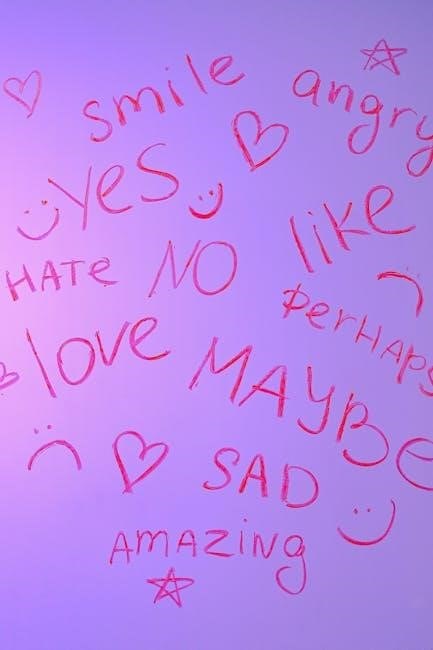Taylor Mali’s poem critiques modern communication‚ highlighting the erosion of declarative speech and the rise of uncertain‚ interrogative tones in everyday language‚ sparking reflection on clarity’s importance.

Background and Relevance of the Poem
Taylor Mali’s Totally Like Whatever‚ You Know? addresses a cultural shift in communication‚ where declarative speech is increasingly replaced by uncertain‚ interrogative tones. The poem highlights how phrases like “you know?” and rising inflections undermine confidence in statements. Mali’s work resonates in a society where ambiguity often overshadows clarity‚ reflecting broader trends in modern language use. The relevance of the poem lies in its ability to spark dialogue about the importance of clear communication in an era dominated by hesitation and doubt. By critiquing this phenomenon‚ Mali encourages readers to reflect on the value of assertiveness and precision in their expressions.
Key Themes and Messages in the Poem
Taylor Mali’s poem explores the erosion of declarative speech and the pervasive uncertainty in modern communication. It critiques the trend of replacing confident statements with interrogative tones‚ often marked by phrases like “you know?” and rising inflections. Mali highlights how this shift reflects a broader cultural reluctance to assert certainty‚ leading to a dilution of clear expression. The poem underscores the importance of reclaiming declarative speech to convey conviction and clarity. By addressing these themes‚ Mali challenges readers to reflect on the impact of uncertain communication on personal and societal levels‚ advocating for a return to confident and unambiguous expression in everyday interactions.

The Erosion of Declarative Speech
Declarative speech has declined‚ replaced by uncertain‚ interrogative tones‚ as seen in phrases like “you know?” reflecting a cultural shift away from confident‚ clear expression.
How Declarative Sentences Have Lost Their Power
Declarative sentences‚ once clear and assertive‚ have faded in modern communication. Phrases like “you know?” and rising intonation now soften statements‚ turning them into questions. This shift reflects a cultural reluctance to sound certain‚ as if confidence in one’s ideas has become uncool. Mali’s poem highlights how declarative speech has been “infected” by an interrogative tone‚ reducing the power of clear expression. The rise of uncertain language undermines authority‚ leaving communication vague and open-ended. This erosion of declarative speech not only weakens individual voices but also diminishes the clarity needed for effective dialogue‚ fostering a culture of hesitation rather than conviction.
The Rise of the Interrogative Tone in Modern Communication
Modern communication increasingly adopts an interrogative tone‚ as seen in phrases like “you know?” and “right?” These additions subtly transform statements into questions‚ fostering a culture of uncertainty. Taylor Mali’s poem illustrates this trend‚ where declarative sentences are diluted by such phrases‚ making speakers appear hesitant. This shift reflects a societal discomfort with assertiveness‚ as confidence in one’s statements is often met with skepticism. The interrogative tone has become a linguistic crutch‚ undermining the directness of communication; Mali critiques this phenomenon‚ emphasizing how it erodes the power of clear‚ confident expression‚ leaving conversations tinged with doubt and ambiguity.

The Role of Uncertainty in Modern Language
Uncertainty in modern language is evident through the frequent use of phrases like “you know?” and “right?” These expressions reflect a hesitation to assert certainty‚ as highlighted in Mali’s poem‚ where declarative speech is often diluted by questioning tones‚ creating a culture of doubt and ambiguity.
Invisible Question Marks and Parenthetical Phrases
The poem highlights how modern speech often ends with invisible question marks‚ turning statements into questions. Parenthetical phrases like “you know?” and “right?” are used excessively‚ undermining confidence. This trend reflects societal discomfort with certainty‚ as people avoid appearing definitive; Mali illustrates this by mocking the tendency to dilute declarative sentences‚ making them sound tentative. Such linguistic habits reveal a broader cultural shift toward hesitation and away from assertiveness. By examining these patterns‚ the poem challenges speakers to reclaim their voice and communicate with conviction‚ emphasizing the importance of clear expression in effective communication.
The Impact of Uncertainty on Effective Communication
The widespread use of uncertain language‚ as highlighted in the poem‚ significantly undermines effective communication. By ending statements with phrases like “you know?” or “right?‚” speakers dilute their authority and clarity. This hesitation can lead to confusion‚ as listeners may question the speaker’s confidence or intent. Over time‚ such communication styles can erode trust and credibility‚ making it harder to convey meaningful ideas. The poem suggests that this trend stems from a cultural discomfort with appearing certain‚ often driven by a fear of judgment or sounding arrogant. Ultimately‚ the relentless use of uncertain language hinders progress and genuine understanding‚ emphasizing the need for clearer‚ more confident expression.

Cultural and Social Implications
Society’s reluctance to sound certain fosters ambiguity‚ weakening relationships and hindering progress. This trend reflects a cultural shift towards tentative communication‚ impacting trust and collaboration deeply.

How Society’s Reluctance to Sound Certain Affects Relationships
The widespread hesitation to assert certainty fosters ambiguity in communication‚ straining personal and professional connections. When individuals avoid declarative speech‚ their messages become vague‚ leading to misunderstandings and weakened trust. Relationships thrive on clarity and confidence‚ but the prevalence of tentative language undermines these foundations. Constant questioning and phrases like “you know?” create distance‚ as others may perceive a lack of conviction or sincerity. This reluctance to sound certain not only hinders collaboration but also fosters a culture of doubt‚ making it harder to establish reliable bonds. Mali’s poem highlights this trend‚ urging a return to clear‚ confident communication to strengthen interpersonal dynamics and societal cohesion.
The Role of Social Media in Shaping Communication Styles
Social media platforms significantly influence modern communication‚ promoting brevity and informality. The rise of short-form content and casual online interactions has normalized uncertain and questioning tones‚ spreading into real-life conversations. Platforms like Twitter and TikTok encourage concise‚ often fragmented expressions‚ which frequently incorporate hedging phrases like “you know?” or “I guess.” This shift mirrors the themes in Taylor Mali’s poem‚ where declarative speech is overshadowed by tentative language. Social media’s emphasis on engagement over clarity fosters a culture of uncertainty‚ as users prioritize relatability and avoiding assertiveness. Consequently‚ these communication styles seep into everyday dialogue‚ further eroding the confidence once associated with clear‚ declarative statements‚ as Mali critiques in his work.

Taylor Mali’s Perspective
Taylor Mali highlights the shift from confident declarations to uncertain speech‚ advocating for clarity and assertiveness in communication to counter modern ambiguity;
The Poet’s Background and Inspiration
Taylor Mali‚ an American slam poet‚ educator‚ and advocate for arts in education‚ draws inspiration from societal trends and personal observations. His poem‚ Totally Like Whatever‚ You Know?‚ reflects his concern about the erosion of declarative speech in modern communication. As a former teacher‚ Mali witnessed firsthand the pervasiveness of uncertain language among students‚ which motivated him to address this issue creatively. His work often blends humor with critique‚ challenging listeners to reflect on their communication styles. Mali’s inspiration stems from his experiences in education and his keen awareness of cultural shifts‚ particularly the rise of filler words and questioning tones in everyday speech.
How the Poem Reflects Mali’s Views on Modern Communication
Taylor Mali’s poem‚ Totally Like Whatever‚ You Know?‚ serves as a satirical critique of modern communication trends. Through humor and irony‚ Mali highlights the pervasive use of filler phrases like “you know?” and the tendency to frame statements as questions. This reflects his view that society has become reluctant to assert certainty‚ leading to a weakening of declarative speech. Mali’s use of rhetorical questions and exaggerated conversational tones mirrors the way people often avoid commitment in their language. The poem underscores his belief that such habits undermine clarity and confidence in communication‚ calling for a return to more direct and assertive expression.

Addressing the Issue
Strategies for reclaiming declarative speech involve embracing confidence and clarity‚ encouraging individuals to assert their thoughts without hesitation‚ fostering more direct and impactful communication in daily interactions;
Strategies for Reclaiming Declarative Speech
Reclaiming declarative speech requires intentional shifts in communication practices. Individuals can begin by practicing assertive statements‚ using confident tones‚ and avoiding filler words like “you know.” Educators and leaders can model clear‚ direct language in their interactions. Additionally‚ fostering environments where certainty is valued encourages others to adopt declarative speech. Mindfulness practices‚ such as pausing before speaking‚ can also help reduce the urge to use uncertain phrasing. By collectively prioritizing clarity‚ society can move away from the habitual use of interrogative tones and toward a culture of confident expression.
The Importance of Confidence in Communication

Confidence in communication is essential for conveying ideas effectively and earning respect. When individuals speak with certainty‚ they demonstrate conviction and authority‚ making their messages more impactful. Confidence fosters trust and credibility‚ allowing others to engage more deeply with the content. It also reduces misunderstandings‚ as clear and direct speech leaves little room for misinterpretation. Moreover‚ confident communication empowers individuals to express their beliefs and opinions without hesitation‚ contributing to a culture of openness and honesty. By embracing confidence‚ people can reclaim declarative speech and assert their voices in meaningful ways‚ ultimately strengthening personal and professional relationships.
Taylor Mali’s poem underscores the decline of declarative speech‚ urging a return to confident communication for clarity‚ trust‚ and meaningful connection in a world overwhelmed by uncertainty.
Taylor Mali’s poem‚ “Totally Like Whatever‚ You Know?” critiques the erosion of declarative speech in modern communication‚ highlighting the rise of uncertain‚ interrogative tones. It explores how society’s reluctance to sound certain has led to a prevalence of filler words like “you know?” and invisible question marks. This shift reflects a cultural discomfort with authority and clarity‚ undermining effective communication. The poem underscores the importance of reclaiming confident speech to foster trust and meaningful connections. Mali’s work serves as a call to action‚ urging individuals to embrace declarative language and reject the trend of ambiguity in their expressions.
Final Thoughts on the Importance of Clear Communication
Clear communication is the backbone of meaningful connections and trust. Taylor Mali’s poem underscores the urgency of reclaiming declarative speech in a world dominated by uncertainty and vague expressions. By embracing confidence and authority in our words‚ we foster respect‚ trust‚ and understanding. The pervasive use of “you know?” and interrogative tones reflects a broader societal reluctance to stand firm in our beliefs. This erosion of clarity not only weakens relationships but also diminishes our ability to convey ideas effectively. Rediscovering the power of declarative language is essential for fostering genuine dialogue and ensuring our voices are heard with the intention and impact they deserve.
